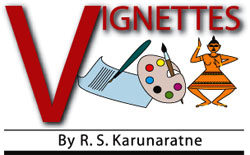
The expanding canvas
Man has used many tools in his long march towards civilization. He
used stone and later iron tools to kill animals, build houses and
cultivate the land. However, the most important tool he has fashioned
for his use is language. Whatever language you speak, it is a useful
tool at every moment of your waking existence. Even when we are asleep
we do dream in words. That shows the importance of language.
Language is mainly used for communication with one another. Apart
from that we use language to talk to ourselves. You might call it
thinking. That means, we use language even for thinking. If we do not
think and communicate with others there will be no progress. In other
words human beings are streets ahead of animals because of this tool
called language.
Languages, like any other entities, grow and disappear sometime. Then
starts the evolution of a new language. For instance, both in the West
and the East there are languages that are no longer used, Latin, Greek,
Pali and Sanskrit are some of the major languages which are no longer
used for communication.
Even the living languages have their lifespan. According to a recent
survey many languages used today for communication may disappear in the
next millennium. Among the living languages, English occupies an
important place. Unlike French, English keeps on changing every day. It
borrows foreign words and expands its word-stock.
Certain grammatical rules have undergone drastic changes. More than
grammar, usage plays a major role in English. So English expands like a
big canvas. A living language has to undergo changes.
English is perhaps the only language that is facing change in several
fronts. For instance, its half a million word-stock is further
expanding. A recent report said new words such as "hoodies, wags, carbon
footprints" and "muffin tops" have entered the English language. By the
way, "a hoodie" is defined as "a young person who wears a hooded sweat
shirt, regarded by some as a potential hooligan."
Terrorism too has given rise to the formation of new words like "Londonistan',
a reference to the British capital being a base for radical Islamists.
One consolation for learners is that all these new words may not take
root. Most of them will vanish from usage.
Text messages
The growing popularity of mobile phones and the use of text messages
have given rise to a new development of the English language.
Mobile phone users ignore basic grammatical rules and use several
abbreviations for sending text messages popularly known as "SMS" (Short
Message Service). The new abbreviations invented by users cannot be
dismissed or condemned as inferior.
If the users were to use full words, it would pose several problems.
So the abbreviations are necessary as long as they can be understood by
the person who receives the message.
Here is a list of common abbreviations used in text messages:
CD: could
FWD: forward
LV: love
MSG: message
PLS: please
PPL: people
SPK: speak
THX: thanks
TXT: text
WD: would
WKND: weekend
XLNT: excellent
Mobile phone users may use different text messages. There are no hard
and fast rules to follow one particular pattern or set of abbreviations.
Sometimes, single letters or a combination of letters are used for
whole words by innovative users, Let's have a look at some of them.
B: be
C: see
R: are
U: you
Y: why
BCNU: be seeing you
CU: see you
LO: hello
NETHNG: anything
NE1: anyone
OIC: oh I see
RUOK: are you ok?
XTRA: extra
Meanwhile, mobile phone users also use numbers to stand for words:
1: one
2: too
4: for
8: ate
The use of acronyms seems to be wide-spread among e-mail users. Look
at some of the following acronyms which appear to be somewhat funny:
ASAP: as soon as possible
ATB: all the best
BTW: by the way
DK: don't know
IMHO: in my humble opinion
IOW: in other words
J/K: just kidding
MYOB: mind your own business
NM: nothing much
OMG: oh my God!
POM: please call me
TTYL: talk to you later
WU?: what's up?
These abbreviations can be easily understood. How about this?
FOTFLOL: falling on the floor laughing out loud
I think that is going too far in text messaging. How on earth can you
remember such acronyms?
One of my colleagues who regularly uses text messages confessed to me
recently that he writes such "silly" abbreviations even in his official
correspondence. Another problems is that he has forgotten his
punctuation marks.
What we have to remember is that sending text messages and e-mails
can be fun for most of us. But we must guard against forgetting basic
grammar and punctuation marks when we write formal letters, essays and
articles. |
